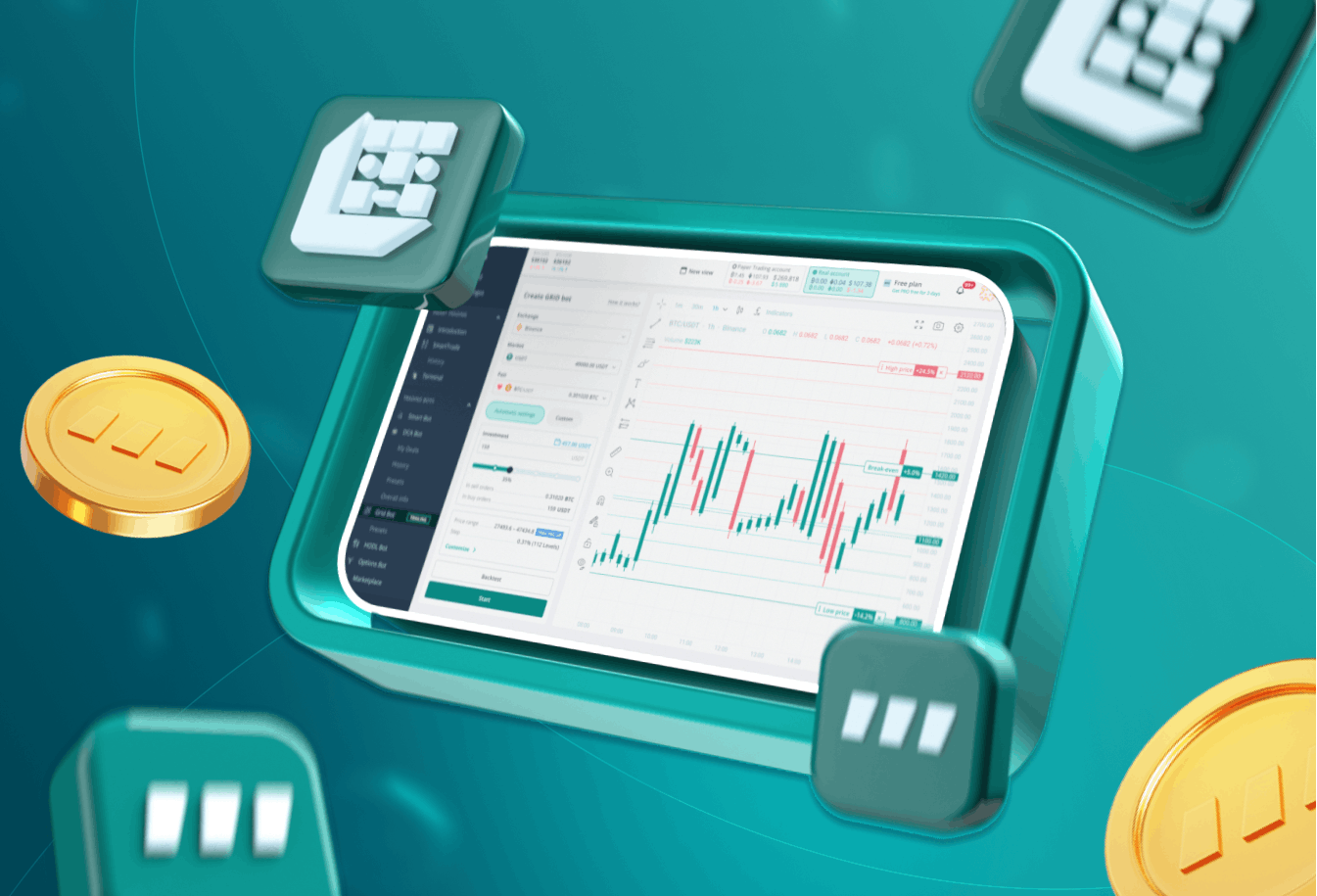- All
- Tools
- Analytics
- Technical Analysis
- Trading
- Blockchain
- DeFi
- Guides
- Company News
- Educational
- Opinion
- Price Predictions
- Market News
- News
- Trading cases
- Practical guides
- Exchanges
- Trading signals
- Cryptocurrency
- Crypto bots
- Other
Become a crypto master
Learn everything about crypto,
trading and bots

The Beginner’s Guide to Crypto Wallets 2023
Learn how automated crypto trading platforms and AI trading bots are changing the role of crypto wallets in 2025, focusing on enhanced security and programmable access.
- What is a Cryptocurrency Wallet?
- Importance of Crypto Wallets
- How Do Crypto Wallets Work?
- Crypto Exchanges vs. Crypto Wallets
- What is a Public Address?
- Public and Private Keys
- Custodial Vs. Non Custodial Wallets
- Cold Wallets Vs. Hot Wallets
- Best Crypto Wallets to Consider
- How Can You Choose the Right Crypto Wallet?
- Conclusion
Start Trading on 3Commas Today
Get full access to all 3Commas trading tools with free trial period

Lots of wallet providers have entered the crypto space in recent years to meet the increasing demand from users. This has given crypto users a lot of different ways to protect their crypto assets.
However, with so many options, it can be challenging to determine the crypto wallet feature that is best suited to your specific crypto storage needs. In this article, we will explore the different crypto wallets on the market to help crypto enthusiasts make the right choice.
What is a Cryptocurrency Wallet?
A wallet (in the crypto world) refers to an app that works as a wallet for storing cryptocurrencies. The name "wallet" comes from its functional analogy to a traditional wallet used to store ID cards and cash.
A crypto wallet, on the other hand, doesn’t store ID cards and physical cash, instead, it stores the passkeys used for signing up for crypto transactions. It also helps users not to lose access to their crypto.
These days, anyone can have access to the blockchain, thanks to crypto wallets. When cryptocurrency was newly introduced, transferring funds required the manual entry of lengthy keys. Modern crypto wallets do everything for you.
Bitcoin's creator, Satoshi Nakamoto, used the first wallet. Hal Finney (who was the first to run the Bitcoin client software wallet) owned the second wallet. He sent the world into a frenzy over the new digital currency after receiving 10 bitcoins from Nakamoto as a test.
Importance of Crypto Wallets
Cryptocurrency can be saved and spent in various ways. Cryptocurrency wallets make it possible for people and businesses to use cryptocurrency in the same way that bank accounts make it possible to use fiat currency.
It's important to have a secure place to store your coins and tokens for many reasons, including:
Transactions
The ability to send and receive cryptocurrency payments is a key function of crypto wallets.
Cryptocurrency Management
Crypto wallets allow users to keep track of their cryptocurrency holdings in a secure location.
Management of Private Encryption Keys
Cryptocurrency is found on the blockchain as a public key address. A crypto wallet facilitates the safe storage and safekeeping of the private encryption keys required to send and receive cryptocurrency.
Username Identities
Cryptocurrencies are stored on a blockchain. Wallets allow transactions to occur by using a username that is associated with a public key address on a blockchain.
Interaction With dApps
Crypto wallets help to access and use decentralized applications (dApps) in the Web3 ecosystem.
How Do Crypto Wallets Work?
Crypto wallets are designed to facilitate user interaction with the blockchain. Wallets act as an intermediary between users and their crypto holdings, which are found on the blockchain.
Cryptocurrency wallets store digital currency and help owners not to lose access to their crypto assets. They also allow crypto owners to make purchases. There are many different types of crypto wallets, ranging from simple online wallets provided by major cryptocurrency exchanges to technically complex and secure hardware wallets.
Crypto assets stored in a wallet can only be accessed with a unique set of keys. A pair of keys (i.e., a public key and a private key) is generated when a wallet is created. Despite their apparent similarities, the purposes of these keys are different.
A public key, just like the account number printed at the bottom of a paper check, can be freely shared with anyone who wishes to send you cryptocurrency.
However, a private key is similar to the PIN of a financial account and must be protected at all costs. If the key falls into the wrong hands, they can do whatever they want with your cryptocurrency.
Any time a user wants to transfer cryptocurrency to another wallet, they simply input the public key of the receiving wallet and the desired amount. If the user wants to receive cryptocurrency, the procedure will be reversed.
Crypto Exchanges vs. Crypto Wallets
If you plan to make money from the crypto market, then you need to understand the difference between crypto exchanges and crypto wallets.
Cryptocurrency exchanges, such as Binance.US, Coinbase, and Crypto.com, (amongst other crypto firms) are some reliable places where you can buy crypto. Users can use cash transfer or their debit cards to buy cryptocurrency from these platforms. A crypto exchange can also be used to swap one cryptocurrency for another cheaply and quickly.
Just like the way you use a wallet, you can also store your digital assets in an exchange, or use it for sending and receiving crypto.
However, an exchange differs from a wallet.
When you keep your cryptocurrency on an exchange, it is held in a wallet that is completely managed by the exchange. When you use an exchange to send cryptocurrency to another user, you are telling the exchange to send the cryptocurrency from its wallet to the recipient's wallet.
On the other hand, when you keep your cryptocurrency in your wallet, you remain the sole custodian. Using a wallet also eliminates the need for a middleman when making transactions. That means you can use your cryptocurrency however you want without fear of repercussions.
Keeping cryptocurrency in an exchange is similar to depositing funds into a bank account while keeping cryptocurrency in a wallet is more akin to carrying cash around in a pocket or purse.
Having cash on hand in a traditional wallet makes it easy to buy whatever you like without anyone stopping you. Similarly, when your cryptocurrency is stored in your wallet, no one but you has access to it.
So, exchanges can be used in the same way as wallets, but they are not wallets.
What is a Public Address?
A wallet's public address is its publicly viewable identifier. It is where your purchased digital assets will eventually end up. The vendor of the cryptocurrency you purchase will send proof of purchase to your verified public address.
You will typically be asked to provide your public address when making a transaction similar to how you would use your bank sort code and account number to send money through a regular bank transfer.
Public and Private Keys
What is a Public Key?
A public key confirms that you own a public address that can send and receive crypto. It is a random combination of numbers and alphabets. A possible example of a public key is Y8asMJk79z9W105yrU82xxO672.
Unlike traditional banking information, public and private keys do not give any information about a wallet’s owner.
What is a Private Key?
It can be likened to a password of crypto wallets. It gives users access to their wallet, where they can purchase crypto, check balances, and so on. It’s like the login information of your virtual bank account. It is an essential part of your cryptocurrency's safety system.
Custodial Vs. Non Custodial Wallets
The main difference between custodial wallets and non custodial wallets lies in the security and the person that is in charge of securing the private keys of a wallet.
Custodial Wallets
They are wallets in which a third party, such as a cryptocurrency exchange, stores a user's private keys and "signs" transactions on their behalf. These types of wallets are ideal for users that are comfortable with giving up control of their keys to a third party.
It's not recommended to keep a huge amount of your crypto assets in a custodial wallet due to the inherent security risks (such as bankruptcy and hacks) involved.
Non Custodial Wallets
Non custodial wallets are often the preferred option for more experienced users or those who want to maintain full control over their private keys. The wallet owner has the sole responsibility of safeguarding the key. Users of these wallets don't have to rely on a trusted third party to keep their funds safe.
Cold Wallets Vs. Hot Wallets
Crypto wallets are divided into two categories which are hot wallets and cold wallets.
Hot Wallets
Hot storage wallets are crypto wallets that can be accessed online. These forms of wallets have easy user interfaces. That is why most wallets are hot wallets. Although hot wallets are preferred due to their convenience, they are more susceptible to hacking. It is therefore not advisable to store substantial amounts of cryptocurrency in hot storage wallets.
The different types of hot wallets include:
Desktop Wallets
Desktop wallets encrypt the user's private keys before storing them on the hard drive of the user's computer. Examples include Electrum, BitPay (this supports biometric authentication), and Exodus.
Pros
- Desktop wallets are perfect for safely completing modest online cryptocurrency transactions.
- They are simple and free.
- No one else has access to your secret information.
- Some of them can be used as cold storage wallets.
Cons
- Most desktop wallets are online whenever the PC is online.
- They may be vulnerable to malware or viruses.
- Anyone who has access to your computer may be able to get to your crypto.
Web Wallets
They offer easy access to crypto holders’ funds from any computer that is connected to the internet. These wallets are offered by a third party, such as a cryptocurrency exchange. Examples of web wallets include Guarda, Coinbase, and Metamask.
Pros
- Web wallets are preferred by most crypto newcomers.
- They can be used to swap, buy, and sell crypto.
- Account protection is outsourced to a reliable third party (usually an exchange).
Cons
- You will be required to trust a third party to safeguard your private keys.
- The computer that is used to access the web wallet can be attacked by malware, viruses, and keyloggers.
Mobile Wallets
They allow crypto holders to securely store their coins and tokens. They also make it easy to transfer and receive cryptocurrency whenever the mobile device is connected to the internet. Examples include Edge, BitPay, Trust, Blockchain.com, and Electrum.
Pros
- You can send payments while on the go.
- They are convenient with an easy user interface.
- They offer an easy way to spend cryptocurrency.
Cons
- Your account could be compromised if your mobile device is lost or stolen.
- The mobile device can be infected by viruses and malware.
Cold Wallets
Unlike hot wallets, cold wallets are not connected to the internet. A cold storage wallet is regarded as the safest crypto wallet and nearly hack-proof. They are also suitable for experienced cryptocurrency investors or those with huge funds since they are harder to use.
The different types of cold wallets include:
Paper Wallets
A paper wallet is a cold storage (or offline wallet solution) where you can write down, print, and secure your private keys. Examples include BitcoinPaperWallet.com and WalletGenerator.Net.
Pros
- It cannot be hacked since it is offline.
- Your private keys are not controlled by any third party.
- The inclusion of a QR code enables easier access.
Cons
- Paper is vulnerable to being misplaced, stolen, burned, or destroyed.
- It consumes more time and effort when moving cryptocurrencies between wallets.
- It requires more technical expertise.
Hardware Wallets
They provide multiple options for storing private keys securely. These gadgets, which look like USB flash drives, don't work unless connected to a hardware device (such as a computer or mobile device). Some of the best hardware wallets include Trezor Model One, Ledger Nano S, and Ledger Nano X (one of the ledger hardware wallets).
Pros
- They offer a secure method of storing cryptocurrencies.
- Crypto transactions are signed via private keys offline. You only need to be online for the transaction to be uploaded online.
Cons
- They are not free. They cost between $30 and $200.
- Beginner crypto users may find them difficult to use.
Best Crypto Wallets to Consider
There are numerous wallets available, making it difficult to choose one. Hence, we've made a list of the best crypto wallets:
Electrum
Electrum works with only one cryptocurrency (it supports Bitcoin); this is why it is referred to as a Bitcoin wallet. Although Electrum does not provide as many altcoin options as other wallets, it more than makes up for it in terms of security measures and transparency. It is a free and open-source wallet that offers two factor authentication, support for multi-signature transactions, and easy connections to cold storage wallets.
Apart from being able to store Bitcoin, Electrum also supports customizable transaction fees since users can set custom transaction fees in mobile and desktop versions of the wallet.
Atomic Wallet
It supports the storage of over 400 different cryptocurrencies. It also allows people to buy, sell, and stake digital or crypto assets without leaving the wallet. Unlike some of its competitors, atomic wallets cannot connect directly with cold storage.
One thing that sets an atomic wallet apart from its competitors is that users can buy a paid membership. This allows users to earn rewards when they carry out transactions using the wallet.
Coinbase Wallet
This is a product that allows users to store crypto themselves instead of leaving them in Coinbase's custody. Users who have never used a non-custodial wallet before may find the Coinbase Wallet a good place to start because it works well with the Coinbase exchange.
Crypto.com DeFi Wallet
Crypto.com DeFi Wallet is a crypto wallet designed for use in the emerging field of decentralized finance (DeFi), which offers alternative forms of financial services like lending and saving without the need for a third-party intermediary.
Crypto.com DeFi Wallet can be used to store and manage digital currencies in a mobile app and a web browser add-on. The wallet also has a desktop app that can be used with Ledger wallets.
MetaMask
MetaMask is a free and open-source wallet for storing, accessing, and interacting with Ethereum-based applications. Many Web3 applications that rely on cryptocurrency transactions can be used with MetaMask.
Although MetaMask does not have a desktop app, it has mobile and browser-based wallets. Also, users cannot stake directly on MetaMask. However, you can stake tokens through the apps that connect to MetaMask on the web.
Trust Wallet
Trust Wallet is Binance's official wallet. It allows users to buy, sell, and trade digital assets without leaving the wallet. It supports over a million different types of crypto assets. Although it doesn't have a browser extension, it provides a way through which users can engage with dApps through a mobile interface.
ZenGo
ZenGo has become the most secure non-custodial wallet in Web3 by getting rid of the flaws associated with private keys.
It is the first Web3 wallet to use encrypted biometrics to prevent private key vulnerabilities although the technology has been used by multibillion-dollar institutions for years.
Hackers will have a difficult time breaking into a ZenGo wallet thanks to the platform's high level of security. You'll need to enable triple-factor authentication during signup. After that, check your email for a confirmation link to complete registration.
Once you've finished those, your decryption key will be safely stored in the cloud. Your encrypted biometrics must be configured as a final step. One of the security measures this wallet adopts is the MPC-based cryptography. In addition, a solution called "Chill Storage" will give you access to your money in case there’s an emergency.
Ledger Nano X
Ledger Nano X is compatible with more than 100 cryptocurrencies and apps. Its package includes Bluetooth and USB-C cable connectivity. You can use this to efficiently control your crypto and NFT holdings.
This crypto wallet makes it convenient and safe to store your crypto assets (i.e., coins and tokens). It is also one of the best Bitcoin wallets.
Binance
This is a central crypto exchange platform with a huge collection of cryptocurrency trading features. Changpei Zhao, a software developer, founded Binance in 2017.
As a crypto wallet, it has features such as staking, auto-invest, DeFi, options, P2P trades, and Futures and Options. Users' confidence in their platform is reflected in the $100 billion in daily trading volume they typically see.
Binance's top-notch safety measures protect users’ cryptocurrencies at all times. It uses two factor authentication (2FA) verification whitelisting of IP addresses, cold storage, and device management to safeguard users’ digital assets.
Trezor Model T
It is one of the most secure and advanced cold storage wallets on the market. This crypto wallet was released in 2016.
You can keep your cryptocurrency and passwords safe with Trezor wallets. It can be used to store over 1800 tokens and coins. It features a touchscreen interface, a more powerful processor, and increased security.
You can feel safer with Trezor T because it is the first hardware to incorporate Shamir Backup (SLIP 39). It protects your recovery seed with a passphrase as well.
Since it is not stored locally, the device is less likely to be stolen. The firmware of the Trezor T is always being updated. It also supports additional security options, such as U2F, PIN entry, and lots more.
Coinbase Wallet
You can buy, sell, transfer, and store digital currencies on Coinbase, thereby making it a versatile wallet. The Coinbase Wallet is a convenient place to keep all of your NFTs and cryptocurrencies in one location.
Coinbase is used by over 35 million people in over 100 countries to store, earn, spend, and trade crypto. This wallet is compatible with over 500 different crypto assets and can be used to store digital collectibles and NFTs.
Coinbase does not store your Coinbase wallet’s private key. During registration, you'll be given a 12-word recovery phrase. The wallet also uses two factor authentication, FDIC-insured US Dollar balances, biometric logins, and AES-256 encryption to keep your crypto safe.
Kraken
Kraken is another crypto firm (or exchange) where you can buy, sell, invest, trade, make limit orders, and do a lot more with cryptocurrencies like Bitcoin and Ethereum. It has been operating as a Bitcoin exchange for a long time.
It is one of the largest cryptocurrency markets, with over 120 different coins supported in over 150 countries. Kraken facilitates both cryptocurrency futures trading and spot trading.
In 2011, Jesse Powell founded Kraken in the San Francisco Bay Area. Also, it offers competitive prices for cryptocurrency trading, which attracts a wide range of institutional and private investors.
Kraken offers several layers of safety, including API key permission control, secure socket layer (SSL) encryption, air-gapped cold storage, stringent surveillance, email confirmation upon withdrawal, and two factor authentication. About 95% of its holdings are stored in air-gapped cold storage.
How Can You Choose the Right Crypto Wallet?
As shown above, there are a plethora of crypto wallets that you can choose from. It may seem like a lot of work when trying to decide which option is best. However, by asking a few specific questions, you may be able to quickly narrow down your options.
Here are some questions you can ask yourself when looking for the right crypto wallet:
Does the wallet support your coins?
Each cryptocurrency works with specific networks, so coins from one network can't be kept in a wallet from a different network. For instance, Sundae (a token issued by Cardano) cannot be stored in an Ethereum wallet. Your top priority is figuring out if the wallet supports your coins.
Is the wallet ideal for the long term?
A highly secure hardware wallet (or physical wallet), such as the Ledger Nano S or Trezor Model T, is a good option if you intend to keep a sizable amount of cryptocurrency in a wallet for a long period.
What is your budget for a wallet?
Hardware wallets can cost $50 to $150 or more, whereas desktop and mobile wallets are typically free.
How often will you be using the wallet?
If you intend to use the wallets for lots of transactions, you may want to select a desktop or mobile wallet for convenience.
Do you have cryptocurrencies from different networks?
A multi-chain wallet, such as Exodus, may be your ideal option if you hold cryptocurrency on a variety of networks. But multi-chain wallets don't always hold tokens for every network. Therefore, if you only use a small number of networks, you may want to use several separate wallets rather than relying on a single, multi-chain wallet.
Will you use the wallet to skate your cryptos?
If you plan to stake your coins, then you need to choose a wallet that has a validator to secure the network while also earning rewards.
Conclusion
Crypto storage is an important practice in safeguarding your crypto holdings. A crypto wallet acts as a digital bank account to which only you have access. Hardware wallets prioritize safety, while software wallets prioritize ease of use.
Choosing the best wallet for your needs (from the multiple wallets considered) is the first step in choosing the right crypto wallet. Hence, ensure you research the options available to you, including their cost and security.
You can go a step further by investing in a hardware wallet since it helps you to be in control of your private keys. Although it may take beginners a longer time to understand how to use hardware wallets, the additional safety they provide is worth the effort. Hardware wallets are suitable for crypto holders with large amounts of cryptocurrency.
Choosing Wallets in the Era of Trading Bots (2025 Update)
In 2025, the distinction between passive wallets and active trading interfaces is more pronounced than ever. As traders increasingly adopt automated crypto trading platforms, including ai trading bot crypto tools and auto crypto trading bots, the wallet’s role has expanded to include execution routing, access control, and data logging.
High-frequency and bot-driven strategies now favor wallets with programmable access layers—like Gnosis Safe, Fireblocks, or Ledger Enterprise—where keys can be segmented by bot role, trading pair, or asset class. This segmentation helps minimize risk if a specific auto trade bot is compromised or malfunctioning.
Retail users deploying DCA bots, signal bots, or altcoin trading bots must now evaluate wallets based on their automation readiness. This includes compatibility with exchange APIs, webhook security, and the ability to interact with third-party crypto trading bot software without exposing full asset control.
Institutional adoption of automated crypto trading has also driven the rise of MPC wallets that support AI-aided transaction signing policies. These allow multi-factor approval logic where certain bot trades (e.g., over a notional threshold or involving illiquid assets) require multi-sig sign-off—even in an automated context.
Security, execution speed, and programmable access are the three pillars of wallet selection for automated traders in 2025—and understanding these is essential for any serious participant in the new bot-powered market structure.
Crypto Wallets FAQ
A crypto wallet refers to a program or device that stores cryptocurrency keys and gives crypto holders access to their assets. A crypto wallet contains a public key and private keys.
Crypto wallets are important tools that allow you to buy, trade, and sell cryptocurrencies. Crypto traders rely on wallets to safeguard their cryptocurrencies and validate their transactions. Custom crypto wallets offer traders more specialized solutions than those provided by cryptocurrency exchanges.
Contrary to what most people think, cryptocurrency is not stored in wallets. Instead, they store the public and private keys necessary for acquiring cryptocurrencies and authorizing transactions with digital signatures.
Crypto wallets are worth having since they help in keeping your crypto safe. They are worthwhile investments, even for small funds, because they keep your private keys safe.
The cost of a crypto wallet depends on the type of wallet that you want to get. While many software wallets are free, hardware wallets cost between $100 and $200.
Exodus wallet is a hot wallet since the keys to the users’ cryptocurrencies are kept in a device that is connected to the internet.

Adedamola is a highly resourceful content writer with comprehensive experience in researching and creating simple content that engage and educate the audience. He is interested in improving the marketing results of blockchain and crypto brands through great content.
READ MORE
- What is a Cryptocurrency Wallet?
- Importance of Crypto Wallets
- How Do Crypto Wallets Work?
- Crypto Exchanges vs. Crypto Wallets
- What is a Public Address?
- Public and Private Keys
- Custodial Vs. Non Custodial Wallets
- Cold Wallets Vs. Hot Wallets
- Best Crypto Wallets to Consider
- How Can You Choose the Right Crypto Wallet?
- Conclusion





